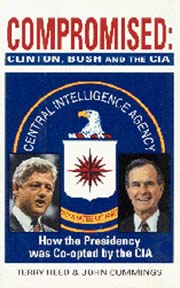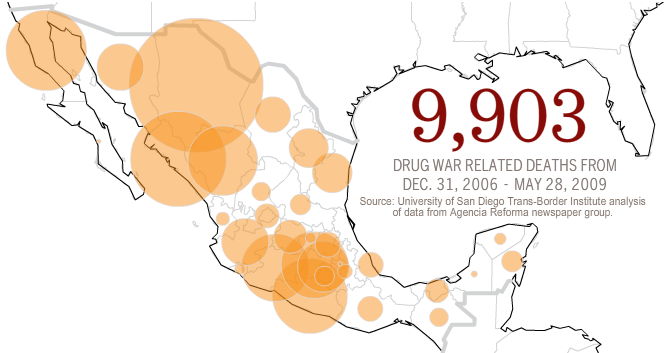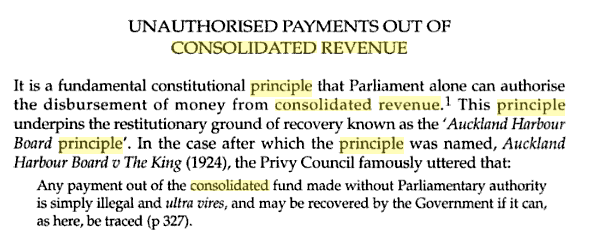October 12, 2009
How the FATF brought down modern civilisation and sent us all to retire in Mexico
 Nobody likes criminals. Even criminals don't like criminals; they are unfair competition.
Nobody likes criminals. Even criminals don't like criminals; they are unfair competition.
So it is with some satisfaction that our civilisation has worked for a 1000 years to suppress the criminal within; going back to the Magna Carta where the institution of the monarch was first separated from the money making classes, and the criminal classes, both. Over time, this genesis was developed to create the rights of the people to hold assets, and the government as firmly oriented to defending those rights.
One of those hallowed principles was that of consolidated revenue. This boring, dusty old thing was a foundation for honest government because it stopped any particular agency from becoming a profitable affair. That is, no longer government for the people, but one of the money making or money stealing classes mentioned above.
Consolidated Revenue is really simple: all monies collected go to the Treasury and are from there distributed according to the budget process. Hence, all monies collected, for whatever purpose, are done so on a policy basis, and are checked by the entire organisation. If you have Budget Day in your country, that means the entire electorate. Which latter, if unhappy, throws the whole sorry group out on the streets every electoral cycle, and puts an entirely new group in to manage the people's money.
This simple rule separates the government from the profit-making classes and the criminal classes. Break it at your peril.
Which brings us to the FATF, the rot within modern civilisation. This Paris-based body with the soft and safe title of "Financial Action Task Force" deals with something called money laundering. Technically, money laundering exists and there is little dispute about this; criminals need a way to turn their ill-gotten gains into profit. When criminals get big, they need to turn a lot of bad money into good money. So part of the game for the big boys was to set up large businesses that could wash a lot of money. It is called laundering, and washing because the first large-scale money-cleansing businesses were launderies or launderettes: shops with coin-operated washing machines, which took lots and lots of cash, in a more or less invisible fashion. Etc etc, this is all well known, undisputed, a history full of colour.
What is much more disputable is how to deal with it. And this is where the FATF took us on the rather short path to a long stay in hell. Their prescription was simple: seize the money, and keep it. It is indeed as simple as the law of Consolidated Revenue. Which they then proceeded to break, as well, in their innocence and goodliness.
The Economist reports on how far Britain, a leader in this race to disaster, has come in 30 short years it has taken to unravel centuries of governance:

The public sale of criminals' property, usually through auction houses or salvage merchants, has been big business for a long time. The goods are those that crooks have acquired legitimately but with dirty money, as opposed to actual stolen property, which the police must try to reunite with its rightful owners. Half the proceeds go to the Home Office, and the rest to the police, prosecutors and courts. The bigger police forces cream off millions of pounds a year in this way (see chart).
So if a crook steals goods, the police work for the victim. But if a crook makes money by any other means, the police no longer works for the victim, but for itself. We now have the Home Office, the prosecutors, the courts, and the humble British Bobby well incentivised to promote money laundering in all its guises. Note that the profit margin in this business is *well in excess of standard business rates of return* and we will then have no surprise at all that the business of legal money laundering is booming:
Powers to confiscate criminals' ill-gotten gains have grown steadily. A drugs case in 1978, in which the courts were unable to strip the traffickers of £750,000 of profits, caused Parliament to pass asset-seizure laws that applied first to drug dealers, and then more widely. The 2002 Proceeds of Crime Act expanded these powers greatly, allowing courts to seize more or less anything owned by a convict deemed to have a "criminal lifestyle", and introducing a power of civil recovery, whereby assets may be confiscated through the civil courts even if their owner has not been convicted of a crime.
Everyone's happy with that of course! (Read the last two paragraphs for a good, honest middle-class belly laugh.) Of course, the normal argument is that the police are the good guys, and they do the right thing. And if you oppose them, you must be a criminal! Or, you like criminals or benefit from criminals or in some way, you are dirty like a criminal.
And such it is. This is the sort of thought level that characterizes the discussion, and is frequently brought up by supporters of the money laundering programmes. It's also remarkably similar to the rhetoric leading up to most bad wars (who said "you're either with us or against us?"), pogroms and other crimes against civilisation.
Serious students of economics and society can do better. Let's follow the money:
Since then, police cupboards have filled up fast. Confiscations of criminal proceeds in 2001-02 amounted to just £25m; in 2007-08 they were £136m, and the Home Office has set a goal of £250m for the current financial year. To meet this, new powers are planned: a bill before parliament would allow property to be seized from people who have been arrested but not yet charged, though it would still not be sold until conviction. This, police hope, will prevent criminals from disposing of their assets during the trial.
This is the standard evolution of a new product cycle in profitable business. First, mine the easy gold that is right there in front of you. Next, develop variations to increase revenues. Third, institute good management techniques to reduce wastage. The Home Office is setting planning targets for profit raising, and searching for more revenue. The government has burst its chains of public service and is now muckraking with the rest of the dirty money-grubbing corporates, and is now in a deadly embrace of profitability with the dirty criminal classes.
 All because the legislature forgot the fundamental laws of governance!
All because the legislature forgot the fundamental laws of governance!
Can the British electorate possibly reel in this insatiable tiger, now they've incentivised it to chase and seize profit? Probably not. But, "surely that doesn't matter," cry the middle-class masses, safe in their suburban homes? Surely the police would never cross the NEXT line and become the criminals, seizing money and assets that was not ill-gotten?
Don't be so sure. There is enough anecdotal evidence in the USA (1) that this is routine and regular. And unchallenged. It will happen in Britain, and if it goes unchallenged, the next step will become institutionalised: deliberate targetting of quasi-criminal behaviour for revenue raising purposes. Perhaps you've already seen it: are speeding fines collected on wide open motorways, or in danger spots?
The FATF have broken the laws of civilisation, and now we are at the point where the evidence of the profit-making police-not-yet-gang is before us. The Economist's article is nearly sarcastic .. uncomfortable with this immoral behaviour, but not yet daring to name the wash within Whitehall. Reading between the lines of that article, it is both admiring of the management potential of the Home Office (should we advise them to get an MBA?), and deeply disgusted. As only an economist can be, when it sees the road to hell.
Britain stands at the cusp. What do we see when we look down?
We see Mexico, the country that Ronald Reagan hollowed out. That late great President of the USA had one massive black mark on his career, which is a cross for us all to bear, now that he's skipped off to heaven.
 Ronald Reagan created the War on Drugs, which was America's part in the FATF alliance. It was called "War" for marketing reasons: nobody criticises the patriotic warriors, nobody dare challenge their excesses. This was another stupidity, another breach of the natural laws of civilisation (separation of powers, or in USA, this might be better known as the destruction of the Posse Comitatus Act). This process took the "War" down south of the border, and turned the Mexican political parties, judiciary, police force and other powerful institutions into victims of Ronald Reagan's "War". From a police perspective, Mexico was already hollowed out last decade; what we are seeing in the current decade is the hollowing out of the Army. The carving up of battalions and divisions into the various gangs that control the flow of hot-demand items to from the poor south to the rich north of the Americas.
Ronald Reagan created the War on Drugs, which was America's part in the FATF alliance. It was called "War" for marketing reasons: nobody criticises the patriotic warriors, nobody dare challenge their excesses. This was another stupidity, another breach of the natural laws of civilisation (separation of powers, or in USA, this might be better known as the destruction of the Posse Comitatus Act). This process took the "War" down south of the border, and turned the Mexican political parties, judiciary, police force and other powerful institutions into victims of Ronald Reagan's "War". From a police perspective, Mexico was already hollowed out last decade; what we are seeing in the current decade is the hollowing out of the Army. The carving up of battalions and divisions into the various gangs that control the flow of hot-demand items to from the poor south to the rich north of the Americas.
When considering these issues, and our Future in Mexico, there are several choices.
The really sensible one would be to shut down the FATF and its entire disastrous experiment. Tar&feather anyone involved with them, run them out of town backwards on a donkey, preferably to a remote spot in the Pacific, with or without speck of land. The FATF are irreparable, convinced that they are the good guys, and can do no wrong. But politically, this is unlikely, because it would damn the politicians of a generation for adopting childish logic while on duty before the public. And the FATF's influence is deep within the regulatory and financial structure, everyone will be reminded that "you backed us then, you don't want people to think you're wrong..." Nobody will admit the failure, nobody will say «¡Discuplanos!» to the Mexican pueblo for depriving them of honest policing and a civilised life.
 The simple choice is to go back to our civilised roots and impose the principle of Consolidated Revenue back into law. In this model, the Home Office should have its business permit taken away from it, and budget control be restored. The Leicestershire Constabulary should be raided by Treasury and have its eBay and Paypal accounts seized, like any other financial misfits. This is the Al Capone solution, which nobody is comfortable with, because it admits we can't deal with the problem properly. But it does seem to be the only practical solution of a very bad lot.
The simple choice is to go back to our civilised roots and impose the principle of Consolidated Revenue back into law. In this model, the Home Office should have its business permit taken away from it, and budget control be restored. The Leicestershire Constabulary should be raided by Treasury and have its eBay and Paypal accounts seized, like any other financial misfits. This is the Al Capone solution, which nobody is comfortable with, because it admits we can't deal with the problem properly. But it does seem to be the only practical solution of a very bad lot.
Or we choose to go to Mexico. Step by step, slowly but in our lifetimes. It took 20 years to hollow out Mexico, we have a bit longer in other countries, because the institutions are staffed by stiffer, better educated people.
But not that long. That is the thing about the natural laws: breach them, and the policing power of the economy will come down on you eventually. The margins on the business of sharing out ill-gotten gains are way stronger than any principled approach to policing or governance can deal with. I'd give it another 20 years for Britain to get to where Mexico is now.

Posted by iang at October 12, 2009 09:01 AM | TrackBack
http://charonqc.wordpress.com/2009/10/28/the-home-office-has-finally-administered-the-coup-de-grace-on-common-sense-and-civil-liberties
Posted by: gyges at October 28, 2009 02:36 AM...
Sir Michael Foot, a former Bank of England official and Bahamas bank inspector, will demand that island paradises must take greater responsibility for their economic futures. He is likely to emphasise that offshore jurisdictions will have no one to blame but themselves if they get into financial difficulties. Foot is also expected to say they have no excuse not to abide by anti-money laundering and counter-terrorism finance benchmarks.
It is understood the government has particular concerns over the ability of Anguilla and Montserrat to ride out the economic storm. The Caribbean islands have been affected by the decline in financial services and US tourism.
In the event of further economic deterioration, certain Caribbean islands could become failed states and be dragged into the illegal drugs trade, Whitehall insiders have said recently.
...
Posted by: Guardian on island goals ... anyone spot a paradox here? at October 29, 2009 04:59 PMhttp://smallwarsjournal.com/blog/2009/11/have-los-pepes-touched-down-in/
Will vigilantes in Mexico succeed where the police and army have failed? Will it take a Mexican "Los Pepes" movement to effectively battle Mexico's drug cartels? Two recent stories from Mexico hint that Mexico's "Los Pepes" may have arrived.
The "Los Pepes" I refer to was the shadowy vigilante group that in the early 1990s methodically reduced Colombian drug baron Pablo Escobar from a Latin American emperor to a cornered animal. As described in Mark Bowden's brilliant Killing Pablo, Los Pepes, obviously enjoying access to the full intelligence file on Escobarís vast organization, systematically murdered or chased into exile the concentric rings of Escobar's supporting infrastructure. ...
Posted by: Have 'Los Pepes' touched down in Mexico? at November 12, 2009 03:03 PMMEXICO CITY -- Mexico's war on drugs took a grim twist this week, as a prominent mayor said he had created an undercover group of operatives to "clean up" criminal elements -- even if it had to act outside the law. Underscoring why the mayor may have felt compelled to take such steps, the new police chief in a neighboring town, a retired brigadier general, was shot and killed Wednesday, four days after taking up his post.
...
His comments came a day after four men who allegedly ran a kidnapping ring in San Pedro were found dead in Mexico City on Saturday. The men, led by Héctor "The Black" Saldaña, were believed responsible for multiple kidnappings in San Pedro and neighboring Monterrey, according to police in Monterrey and San Pedro. The four are believed to be tied to a drug cartel, police said.
The men's bodies showed signs of torture, Mexico City police said, and next to them lay a note: "That's for being a kidnapper. Signed: The boss of bosses. Job 38:15." The Bible passage from the Book of Job reads "The wicked are denied their light, and their upraised arm is broken."
Mr. Fernández took his oath of office on Saturday, delivering a speech in which he told a crowd of supporters that he had good news: Mr. Saldaña and his accomplices, who had terrorized the town, were dead. The crowd gave him a standing ovation, according to media reports.
Mexico City police discovered the bodies of the four men several hours after the mayor said they were dead, and the men weren't identified by police as the alleged kidnappers until two days later.
...
